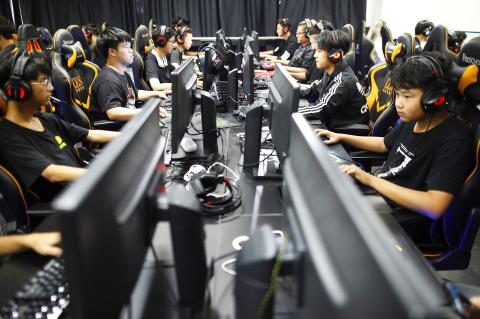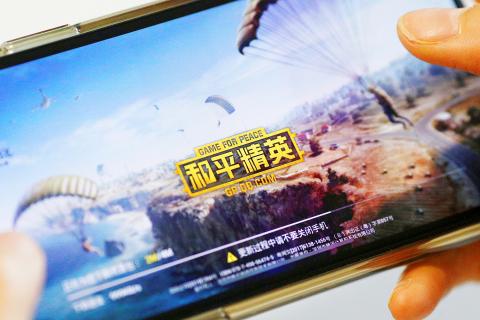In recent years, China’s government has vociferously criticized video games, which it says have a deleterious effect on children. Last week, the Chinese government announced a new policy which will introduce strict controls on minors playing video games, through a real-name user identification system. Chinese citizens aged under 18 years old will be banned from playing online games between 10pm and 8am and will be restricted to 90 minutes per day outside these hours during weekdays, and three hours on weekends and during holidays. Spending limits will also be introduced to restrict the amount of money minors are able to spend on online games.
According to reporting by the BBC, in addition to announcing a video game curfew on Nov. 5, the Chinese authorities also introduced restrictions on spending. Spending by Chinese gamers aged between eight and 16 years old will be capped at 200 yuan (approx. NT$880) per month, while 16-18-year-olds will be limited to 400 yuan (approx. NT$1,700).
Underage gamers will be required to register using their real names and provide additional information to verify their identity, including their mobile phone number and WeChat ID. Although all gamers must already provide valid identification credentials to register an online gaming account, in reality a large number of underage gamers use their parents’ information to register. This has made it difficult for the authorities to implement effective controls. Under the new system, the Chinese government will work with law enforcement agencies to build a “unified identification system” that can be used by all gaming platforms

Photo: EPA-EFE
照片:歐新社
Last year the WHO for the first time listed gaming addiction as a mental illness. Having previously strongly criticized video game companies for products that have a negative effect on children, last year the Chinese government established a gaming regulator, delivering a blow to the lucrative gaming industry.
China is currently the second-largest market for video games in the world. The increased regulations imposed on the industry by China’s government have already started to bite. This year the US is forecast to overtake China as the world’s largest revenue-generating market for video games.
(Translated by Edward Jones, Taipei Times)

Photo: Reuters
照片:路透
中國政府近年大力批評「電玩遊戲」可能對青少年產生不良影響,因此上週公布了新政策,嚴格要求未成年玩家以「實名制」認證身分,並禁止十八歲以下的玩家在晚上十點到早上八點間上線玩遊戲,平日也只能玩九十分鐘,假日則限制為三小時;同時也限制玩家花費在遊戲上的金錢。
據英國廣播電台報導,中國政府十一月五日宣布實施青少年的「電玩宵禁」,此外連消費都有限制,八到十六歲的玩家每月最多只能花費人民幣兩百元(約新台幣八百八十元),而十六到十八歲玩家最多能花費人民幣四百元(約新台幣一千七百元)。
若未成年玩家欲註冊遊戲帳號,皆須以「實名制」進行驗證,包括「本人的」手機號碼、微信帳號或其他個資等,所有網遊用戶皆須使用有效的身分資訊才能註冊,但實際上仍有許多未成年人使用家長資料來註冊遊戲帳號,導致針對未成年人的管理難以徹底執行。未來中國政府將與執法部門合作,建立一個統一的識別系統,讓所有遊戲平台都能使用該系統,讓玩家通過驗證身分和年齡的關卡。
去年,世界衛生組織首度將「遊戲成癮」視為精神疾病的一種,中國近來也大力批評電玩遊戲會對青少年產生負面影響,去年建立遊戲監管機構後,對利潤豐厚的遊戲產業造成打擊。
據統計,中國是世界上第二大的遊戲市場,由於中國對遊戲產業的監管日益嚴格,讓美國今年的遊戲收入首次超過中國。
(自由時報)

A: In its latest annual travel guide, Bloomberg recommended two restaurants in Taipei: Golden Pig barbeque from South Korea and two-Michelin-star restaurant A. B: Also, tourists should definitely try Taiwanese cuisine while they’re here. Mountain & Sea House, Shin Yeh Taiwanese Cuisine, and Fujin Tree Taiwanese Cuisine & Champagne are good options. A: For local snacks, Fu Hang Soy Milk, Fu-Ba-Wang Pigs’ Knuckles Restaurant, and Wang Ji Rice Dumplings are all very popular. B: And the gold medalists of the 2025 Taipei International Beef Noodle Festival — Yun Shui Kitchen, The Howard Plaza Hotel Taipei, and Come N’ Eat

A: Bloomberg just released its annual travel guide, titled “25 Best Places to Travel in 2026.” What were the best Asian destinations? B: There were actually six Asian hotspots: Taiwan’s Taipei, Malaysia’s Penang, Kazakhstan’s Almaty, Indonesia’s Rote Island, India’s Tiger Reserves, and Oman. A: With its mix of traditional food and modern cuisine, Taipei has become a rising food capital in Asia. B: As Bloomberg reported, “Taiwan is a place that bubbles up in culinary conversation because of its famed beverage, bubble tea, and its early adoption of modern night markets.” A: And Din Tai Fung has now

Facing relentless flooding and rising expenses, Dumble Farm in England has stopped selling milk and started an unexpected but therapeutic venture: cow cuddles. In 2022, the owners sold most of their dairy cows and began letting visitors spend time brushing, petting, and even hugging specially trained Highland cows for 95 pounds per session. This unusual shift reflects the rise of the so-called healing economy, a sector where animal-assisted experiences are marketed as emotional remedies for stress and burnout. While dogs and cats remain the most common therapy animals, cows are gaining popularity for their calm nature. At Dumble Farm, only cows that

Owls have long fascinated people with their distinctive appearance and mysterious habits. These nocturnal birds possess large, round eyes and a flat facial disc. Their feathers come in shades of brown, gray, or white, helping them blend easily into the darkness. The most remarkable trait of owls is that they can turn their heads without damaging blood vessels. Contrary to popular belief, they can only rotate their heads up to 270 degrees, not 360 degrees. Owls have 14 cervical vertebrae, which is twice as many as humans. This special physical structure compensates for their inability to move their eyes within their